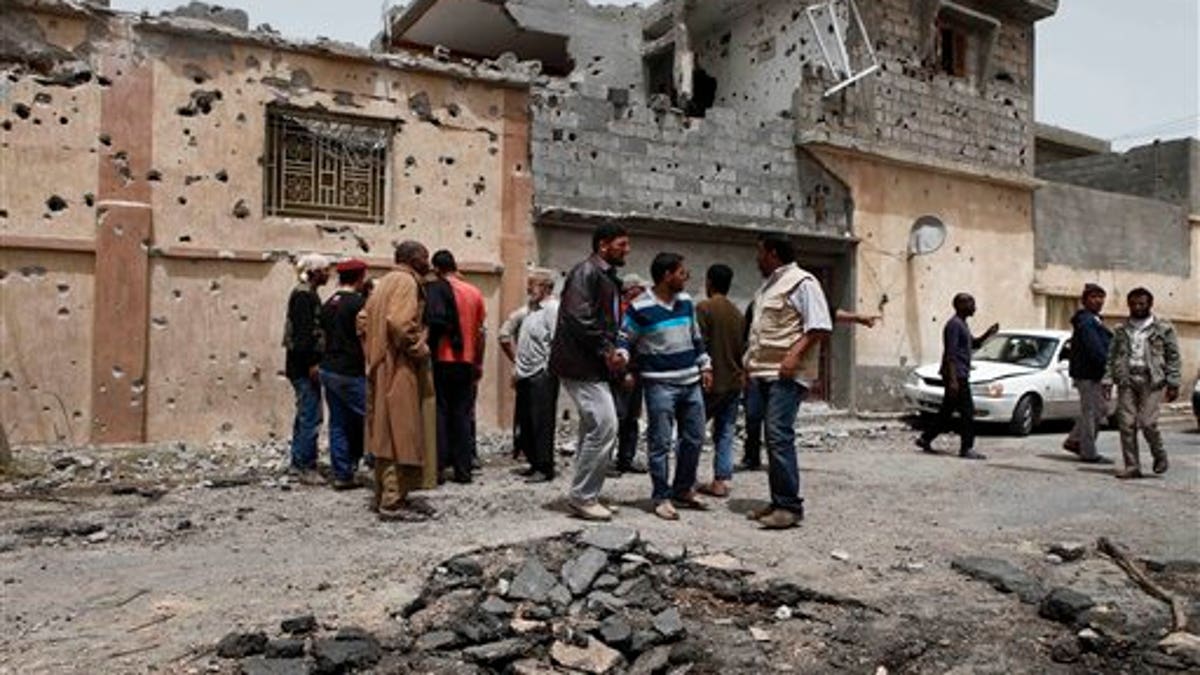
April 25: Neighbors examine the damage to a house which was struck by a shell in Misrata. Qaddafi's troops on the outskirts of Misrata unleashed more shells into the city Monday, hitting a residential area and killing 10 people, including five members of one family, according to a doctor in Misrata. (AP)
ABOARD THE RED STAR 1 – Libyan government forces on Tuesday bombarded the port of Misrata, in a virtually nonstop assault on the sole lifeline of a battered population that has been under siege for the past two months.
While forces loyal to Muammar al-Qaddafi pulled out of the city over the weekend under pressure from NATO airstrikes, they have since unleashed a withering rocket and mortar barrage on Misrata that has killed dozens. The bombardment Tuesday was constant throughout the afternoon and into the evening, and loud explosions could be heard thundering across the city.
"It was horrific, like a scene from World War II," said resident Saddoun el-Misurati who was waiting to evacuate his mother from the port when the rockets began to fall. "I stopped counting after nine."
Hundreds of residents, including migrant African laborers, had been waiting at the port for the expected afternoon arrival of the Red Star 1, an Albanian ship chartered by the International Organization of Migration to evacuate people from the besieged city.
The crowd gathered on the docks scrambled for cover when the rockets began falling, hiding in cars and shipping crates or just fleeing the port area, said el-Misurati.
Even after sundown, Qaddafi's forces continued to shell the port.
Abdullah Abodabbous, a 25-year-old from Benghazi, said he was trying to leave on a small, previously arranged vessel when a barrage of at least 10 Grad rockets slammed into the port around 9 p.m., forcing him to hide under a table in offices near the main entrance.
With Qaddafi's troops besieging the city on all sides by land, the port has become a key point in the battle for Misrata.
It has served as a lifeline for the city, allowing in desperately needed medical supplies and food and ferrying out residents looking to flee the fierce fighting that has left swaths of the city in ruins.
Tuesday's assault by pro-Qaddafi forces temporarily suspended the flow of aid and people. An Albanian passenger ferry carrying ten shipping containers of aid and two ambulances was expected to dock around noon, but instead motored off the coast for hours as Qaddafi's forces pounded the port. It
"It was too risky to go in given the darkness and the security situation inside the city in general. Hopefully we will be able to go in tomorrow," said Othman Belbeisi, an official with the International Organization for Migration, which organized the ship.
Belbeisi said the decision was made after consulting with the port authority.
The battle for Misrata, which has claimed hundreds of lives in the past two months, has become the focal point of the armed rebellion against Qaddafi since fighting on the eastern front near the city of Ajdabiya is deadlocked.
Video of Misrata civilians being killed and wounded by Qaddafi's heavy weapons, including Grad rockets and tank shells, have spurred calls for more forceful international intervention to stop the bloodshed.
The Libyan government has denied that it engages in indiscriminate shelling of civilian population centers.
It is precisely to protect civilians that NATO launched it air campaign March 19 against the forces of Qaddafi that were seeking to retake parts of the country lost to a rebel uprising that began in mid-February.
Much of the east of the country is now in rebel hands, along with a scattering of mountain towns on the western border and Misrata itself, 125 miles southeast of Tripoli.
On Monday, NATO bombs slammed into a building in Qaddafi's official residence in Tripoli, in what the government maintained was an assassination attempt.
U.S. Defense Secretary Robert Gates defended the alliance's decision, and said military command centers are legitimate targets for U.S. and NATO air attack, suggesting Qaddafi himself is increasingly in danger.
"We are not targeting him specifically, but we do consider command and control targets to be legitimate targets wherever we find them," Gates told reporters in Washington after a meeting with his British counterpart, Liam Fox.
Although Gates said such targets have been considered legitimate from the beginning of the NATO-led air campaign more than one month ago, the initial bombing focus was on Qaddafi's air defenses, supply depots and maneuvering ground forces.
Now NATO is attempting to ratchet up pressure on Qaddafi and those in his inner circle by holding at risk his command centers as well as related structures that enable the regime to exercise power.
This appears to represent an evolution of the air campaign, which is adjusting its targeting priorities as Libyan forces have adapted to weeks of airstrikes on ground forces, the imposition of a no-fly zone and persistent rebel assaults in several key areas.








































